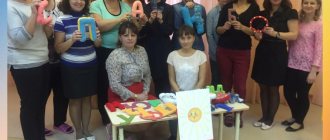Article “Modern forms of interaction between a speech therapist teacher and a family in a preschool educational institution”
- Modern forms of interaction between a speech therapist and a family in a preschool educational institution.
Working on the problem of organizing the work of a speech therapist with a family, you come to the conclusion that interaction with a child’s family is one of the difficult aspects of a speech therapist’s work.
Often teachers experience difficulties in establishing contact with parents of students. In modern educational conditions, as part of the implementation of the Federal State Educational Standard, parents are direct full participants in the educational process. And the task of teachers is to create such conditions, use such methods and forms of work so that the inclusion of the family becomes the most effective, productive and beneficial in achieving common goals. Traditional forms of working with parents (conversations, consultations, parent-teacher meetings) did not allow them to become full participants in the educational process. As a rule, they acted as passive observers or listeners. Such forms of interaction did not allow taking into account the characteristics of the child and family. Parents could not influence the correction process. In turn, the specialist could not attract parents to his side as direct assistants.
The analysis of the traditional forms of speech therapist work with families in kindergarten showed that: - work with parents was not carried out in a differentiated manner, the characteristics of the child and family were not taken into account; — parents could not influence the pedagogical process. They were involved only in the implementation of organizational issues.
Traditional forms, when executed well, undoubtedly achieve their goal. Many of them are useful, interesting and necessary, as they were aimed at interacting with a wide range of parents, with the entire parent group of the group.
In modern conditions, more relevant are forms of work that provide solutions to the problem of each child and family individually.
That is why active interaction between specialists and parents is currently in demand, which would improve the pedagogical culture of parents and develop in them the necessary pedagogical skills.
One of the most important areas of correctional work with preschoolers is the correction of speech disorders, the prevention of speech disorders, early diagnosis, and the preparation of children with speech disorders for schooling. Many years of experience show that the success of correctional education is largely determined by how clearly continuity is organized in the work of the speech therapist and parents. No educational system can be fully effective if the family is not involved in it. Parents are often not competent in matters of mental and speech development of children. In order for the cooperation between the speech therapist and the family to be most effective, it is necessary to clearly define the tasks of speech therapy work. It is important for a speech therapist to involve parents in correctional work and familiarize them with the methods of teaching and developing speech. To help parents see the child’s current problem, or, conversely, to convince them of the child’s success in mastering certain knowledge and skills. Convince parents that it is necessary to consolidate the studied material at home.
Organization of work with families in preschool educational institutions
is carried out in the following directions:
Informational:
— acquaintance with the primary, intermediate results of psychological, pedagogical, speech therapy examination; — acquaintance with age-related characteristics of mental development, stages of development of children's speech; — familiarity with methods and techniques of correctional and developmental influence.
Educational:
— involving parents in active participation in the correction process to overcome the child’s speech defect; — training parents in methods of correctional and developmental work with a child; — formation of parents’ ideas about readiness for school.
Organization of interaction between a speech therapist and parents of students
When building effective interaction with parents, it is necessary to consider some important points:
1
.
Creating an objective positive image of the child among parents
. A speech therapist teacher should never make complaints to parents about a child. Even if a child cannot cope with something, or experiences certain difficulties in learning, the teacher’s task is to find something positive that the child has, which he can cope well with, and based on this, solve certain problems. In a conversation with a teacher, a parent should not feel that his child is worse than other children. A teacher should never compare one child with another. But at the same time, the speech therapist should not hush up and hide from parents important information about certain problems associated with their child. Parents must be fully informed about the child’s development, and the speech therapist’s task is to find such an approach to each parent and convey this information to parents so that it is not perceived negatively.
2. Transferring to parents knowledge about the child, about his life in the preschool educational institution.
The speech therapist must systematically provide parents with information about the successes of learning and the difficulties of their child’s development in the speech therapy group, the peculiarities of his communication with other children, and introduce him to the results of correctional activities.
3. Establishing trust
. We can talk about establishing positive interaction if parents begin to trust the teacher with their problems and difficulties in raising and educating their child. At this stage, the active role belongs to the parents, the speech therapist only supports the dialogue. Without giving your assessments. It must be remembered that information received from parents is strictly confidential and can only be used to organize positive interactions.
4. Joint work on the formation and development of the child’s personality
. Only at this stage can a teacher who has won the trust of parents give advice and recommendations to parents.
Modern forms of interaction between a speech therapist and a family in a preschool educational institution.
Parent meetings.
This type of interaction remains relevant today. Parents are offered various topics for meetings: “Results of a survey of children’s speech at the beginning of the school year”, “Introducing parents to the tasks and content of correctional work”, “Joint work of kindergarten and parents to prepare the child for school”, “Development of fine motor skills and preparation hands to the letter”, “Results of correctional work for the year”. Parent meetings can be organized, for example, in the form of a “round table” or a “speech therapy lounge”. The most important thing is to create a trusting and positive atmosphere so that every parent can feel comfortable.
Maintaining homework notebooks for joint activities.
This type of interaction is also very valuable for a specialist because here one can monitor the effectiveness of organizing the interaction of all participants in the educational process. The homework notebook is a connecting link in the “speech therapist-child-parent” system. The speech therapist provides parents with the opportunity to monitor the dynamics of their child’s learning and organize their participation in homework. This type of work is the most optimal way to individually interact with parents. The parent becomes a full participant in the correction process. Helps the child in completing certain tasks, knows what stage of learning his child is at, knows what the child can’t do, and what the child can do well. In turn, the speech therapist has the opportunity to assess the degree of participation and desire of parents to participate in the correction process by the quality of homework performed. By giving each child his own individual task, the speech therapist has the opportunity to fully implement an individual approach. Maintaining home notebooks directly affects the performance of the speech therapist.
Organization of a parent community on the social network “VKontakte”.
This type of interaction has become the most relevant and popular lately. Universal accessibility to Internet resources allows the speech therapist to maintain contact with the parents of students, albeit at a distance, and parents, in turn, can keep up to date with the news, share information with each other about the educational process, even with limited time and the impossibility of direct participation in the life of a child in a preschool educational institution.
Club for parents “Speech therapy lounge”
This form of interaction allows us to solve many problems. Parents take an active part in planning and organizing the work of the club. Current issues are put on the agenda, and ways to solve problems are considered. Parents conduct training games and master classes for other parents. In this way, they can fully realize themselves as full participants in the educational process.
Testing and questionnaires
. Firstly, it allows you to identify the most pressing problems for parents. Secondly, they allow the speech therapist to organize his work more effectively, in accordance with the needs of parents.
Home game library
. This section introduces parents to simple, but very interesting, and most importantly useful games for children; it includes a description of games that promote the development of a child’s speech, which parents could play with their child at any time convenient for them: “In the kitchen”, “ On the way to kindergarten”, “In a free moment”.
A collection of methodological recommendations.
It has proven itself well in organizing homework by parents in compensatory groups. Every week, new information is added to the collection, recommended tasks for parents, poems, riddles to consolidate those skills that children have mastered over a certain period of time. This allows parents to see what the child has learned this week and continue working at home to consolidate these skills.
Open days.
Parents attend individual and subgroup classes, watch how their children are doing, what they need to reinforce at home, and what else needs to be worked on. Often the speech therapist himself invites parents to such classes.
Parental five minutes.
They are recommended when working both in a speech therapy group and at a speech center, where parents receive the opportunity for short-term personal consultation.
Seminars - workshops.
At such events, parents have the opportunity to receive new, useful information. They also have the opportunity to practice performing certain tasks under the strict guidance of a speech therapist. For example, in performing articulation gymnastics, breathing exercises, finger gymnastics, try out some types of aids that a speech therapist uses in classes. As a rule, such workshops have very positive reviews from parents; they bring them closer to teachers and allow them to better understand the specifics of the work.
Master classes.
Allow parents to learn new things. He becomes one step closer to a specialist and becomes a bit of a teacher himself in working with his child.
Holidays, entertainment, speech therapy KVNs, quizzes.
Parents are invited to participate. At the end of the year or during the year, parents are invited to these holidays, where children demonstrate all their knowledge, skills and abilities acquired during the year. What is important is that parents also become active participants in these events.
Joint projects.
They allow all participants in the educational process to express themselves in a new way, to discover new opportunities for the implementation of their skills. Projects allow you to diversify and enrich the educational process, making it more interesting. Parents, children and, of course, specialists actively participate in the projects. For example, parents, together with their children, actively participate in creating books of fairy tales about a funny tongue, creating illustrations for folding books, etc.
Speech therapy page on the website of a preschool educational institution or the personal website of a speech therapist.
On the website of the preschool educational institution or on his personal website, the specialist posts various information relevant to parents: consultations on topics of interest, video and photo reports on ongoing projects and open events and classes, intermediate and final results of speech therapy examinations, videos of training master classes, etc. d. The availability of this information allows you to interact with parents more effectively. The use of this resource increases the competence, education and awareness of parents.
Mailbox “Ask a question to an expert.”
This form of work allows the speech therapist to provide feedback to parents. A parent has the opportunity to anonymously ask a specialist a question and receive an answer without meeting him in person. Such mailboxes are installed on each group. This type of interaction is necessary for very busy parents who do not have the opportunity to personally meet with a speech therapist, as well as for parents who, for various reasons, are afraid or embarrassed to ask this or that question.
When working with parents, visual aids are widely used: - special speech therapy corners “Speaking correctly” “Advice from a speech therapist”; — information stands; — thematic book exhibitions; - manuals, memos, samples of completed tasks.
They contain useful information that parents can review when picking up their children as they get ready to go home. The material on the stands is updated at least once a week. When designing stands, not only drawings and handwritten inscriptions are used, but also posters and photographs.
The advantages of new forms and methods of interaction between teachers and parents are undeniable and numerous.
Firstly
, this is a positive emotional attitude of teachers and parents to work together to raise and educate children. Parents are always confident that teachers will always help in solving pedagogical problems and at the same time will not harm. Since they will take into account the opinion of the family and suggestions for interaction with the child. Teachers, in turn, gain understanding from parents in solving problems. And the biggest winners are the children for whose sake this interaction is carried out.
Secondly,
This is taking into account the child's individuality. The teacher constantly maintains contact with the family, knows the characteristics of each child and takes them into account when working, which, in turn, leads to increased efficiency of the teaching process.
Third
, this is the strengthening of family ties, which, unfortunately, is also a problematic issue in pedagogy and psychology today.
Fourth
, this is an opportunity to implement a unified program for the upbringing and development of a child in a preschool educational institution and in the family.
When implementing new types of interaction with families, it is possible to avoid those disadvantages that are inherent in old forms of working with families. Analyzing the results of your work pleases both children and, of course, their parents. They themselves begin to take an interest in the success of their children, offer help, control and focus on beautiful, correct speech.
These forms of work make it possible to involve parents in active participation in the correctional process, imply the establishment of trusting partnerships between teachers and parents, and awareness by parents of their role in the education and upbringing of the child. As a result, the main goal of this interaction is achieved - to provide the most favorable conditions for the full and comprehensive development of the child.
Areas of joint activity
- establishing partnerships and creating an atmosphere of mutual support;
- formation of a motivated attitude of parents towards correctional activities;
- selection and implementation of various variable forms of interaction;
- increasing the psychological and pedagogical competence of parents in matters of child speech development;
- providing practical assistance to parents, supporting their confidence in their own pedagogical capabilities;
- training parents in specific speech therapy techniques


